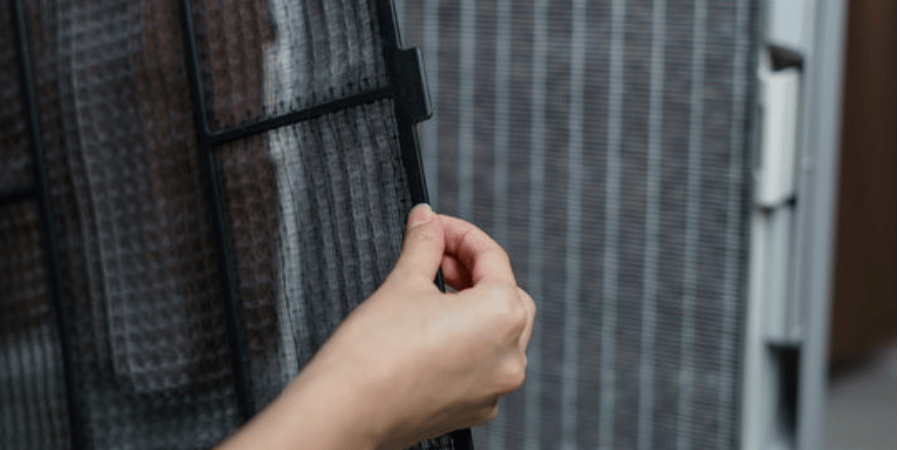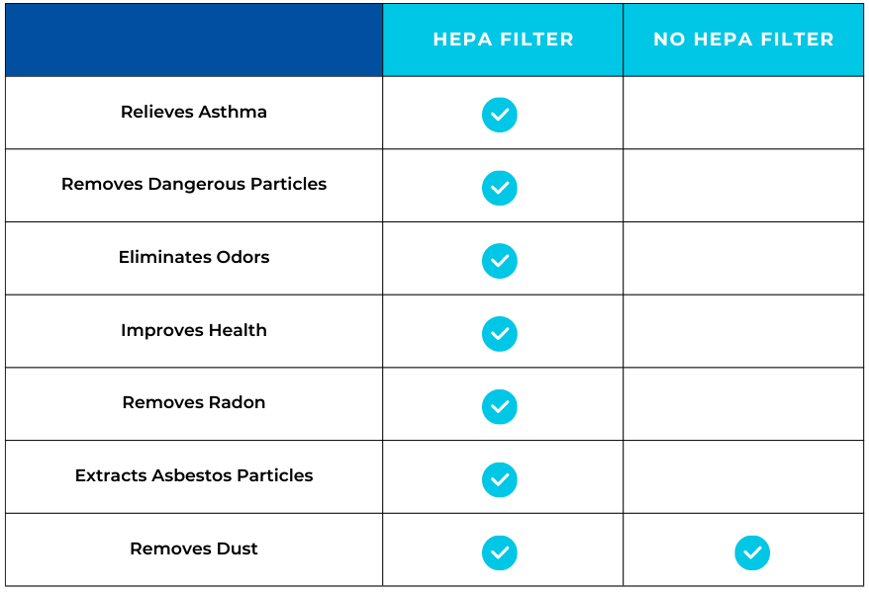Share this
Benefits of Using an Air Purifier with a HEPA Filter vs. Without?
by HEPACART on Feb 21, 2023

Investing in an air purification machine is a great step in achieving clean air. However, they are not always the best option for large facilities. Standard air purifiers make promises to create clean air, but many of those devices do not live up to their word and fail to remove harmful particulate matter. An air purifier and a HEPA filter can increase the purifier’s efficiency. Let’s look at why an air purifier and a HEPA filter are individually and examine why they pair well together.
Indoor Air Quality
Many people understand that outdoor air can be polluted by motor vehicles, smoke, and industrial facilities. However, indoor air can be just as harmful. Pesticides, cooking, and combustion activities are a few examples of how particulate matter gets suspended in the air. Indoor air quality (IAQ) can drastically affect a person’s health. When the IAQ inside a facility is poor, it can result in a runny nose, irritation, headaches, and fatigue. Exposure to poor IAQ for extended periods can produce long-term health problems like respiratory diseases, heart disease, and even cancer.
There are numerous actions you can take that will better your IAQ. Washing sheets and keeping up with household chores can eliminate accumulated dust. Avoid smoking and preventing water from pooling in your home and creating mold are other simple ways to improve IAQ. However, the most effective way to remove particulate matter from the air is by using a strong air purifier with a HEPA filter.
Why You Should Use an Air Purifier
Maintaining proper IAQ is essential for good health and should be monitored closely. Taking steps to ensure air flow is properly ventilated is one way to combat poor IAQ, but one of the most effective ways to utilize strong air purifiers. These machines work to refresh stale air and can eliminate types of harmful pollutants. Air purifiers have a filter and a fan to move the air through the machine and trap any harmful particles. Circulating the air with a strong air throw method can fill a room with clean air. However, many standard air purifiers do not have that power and end up circulating a small area. When this is the case, many of the harmful particles are not removed from the air, just relocated. Choosing an air purifier that uses clean air technology will increase its effectiveness by producing pure air.
What is a HEPA Filter
A high-efficiency particulate air (HEPA) filter is known for its deep and thorough ability to remove tiny particulate matter from the air. At least 99.97% of size 0.3 microns can be captured by a Hepacart HEPA filter, promoting clean and safe air. When a particle is larger than 0.3 microns, the filter can even more efficiently trap the particles. Dust, pollen, and bacteria are just a few of the airborne contaminants that a HEPA filter targets. However, HEPA filters cannot completely remove VOCs, ozone, and fine particles.
Synthetic fibers and glass are intricately woven together to create a HEPA filter. Synthetic fibers serve as the membrane while glass fibers work to catch the particles. The fibers are tightly packed together and interwoven to ensure that as many harmful particles as possible are filtered through the system and removed from the air.
HEPA filters have two grades, H13 and H14, and must be tested to be labeled as a HEPA filter. The manufacturer and an independent professional perform the tests to ensure it lives up to specific standards. These represent the level of filtration your HEPA filter will achieve. H13 filters follow the ISO and European Standard definition of HEPA, meaning they remove at least 99.95% of contaminants. However, H14 is the highest grade of HEPA filters and removes at least 99.995% of 0.3-micron contaminants. These filters follow the American Society of Medical Engineers (ASME), Environmental Protection Agency (EPA), and US Department of Energy definition.
Why You Should Use a HEPA Filter With Air Purifier
Not all air purifiers can produce the same level of IAQ. Air quality can remain contaminated if a sub-par air purifier is used. However, there are ways to get the most out of your air purification machine. A HEPA filter must meet specific standards that general air purifiers do not have. Pairing a HEPA filter with an air purifier gives you the best of both worlds. It will work as a normal air purifier for dust and remove the tiny particulate matter in the air that the HEPA filter targets. These are often medical-grade air purifiers and can trap pollutants via diffusion, interception, or impaction.

GermBuster 300 Room Air Purifier
Hepacart provides an air purifier with a HEPA filter to provide continuous decontamination of any harmful particles. This high-precision air purification machine operates 40% more efficiently than similar products. Not only will it help you gain proper IAQ, it will also save money and in utility costs. These commercial-grade devices are built to last and will provide your facility with clean air for years to come.
How to Achieve Clean Air
Finding the proper air purification machine for your facility is essential. HEPACART only provides the highest quality equipment to ensure your facility remains safe and promotes good health. Want to learn more about our products and explore all of your options? Download our pricing guide today!

